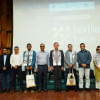Your guide to landing a job at an international development organisation

Have you ever dreamt of working with an international organisation? The idea of contributing to the sector of global development can be both thrilling and daunting. When I first considered pursuing a career in this field, I had no clear idea where to begin. However, as I explored further, I realised that although international organisations have their own unique structures, the process of applying for a role in one of them is not too different from any other job.
For starters, looking for a role in such organisations is fairly easy. This is because the information required to apply tends to be accessible. Platforms such as LinkedIn, UN Careers, and UN Volunteers offer direct access to job listings from international organisations, making it easier than ever to find opportunities in international development organisations. All the job seekers have to do is seek out a role that match their skills and apply accordingly.
Lamia Mohsin, a reporting and knowledge management associate at the United Nations Development Programme (UNDP) in Bangladesh, offered valuable insights into navigating the international development career landscape. According to Lamia, "Soft skills are critical for navigating the complexities of international development. Some of the most important ones include adaptability, the ability to work in diverse contexts, critical thinking, and, above all, empathy."
These skills are essential because international development requires professionals who can adjust to different environments while engaging with various cultures and dealing with global challenges.
For those considering a career in international development, it's important to understand that the route can vary based on individual interests. Lamia explained that the sector offers a wide range of roles, from policy and advocacy to research, communications, and programme implementation.
"Progression typically involves gaining field experience, networking, and taking on leadership roles. Many professionals transition from local non-governmental organisations to regional or international roles before moving on to senior positions within international organisations such as the UN," she explained.
While there is no single route to success, gaining experience and expanding your network is essential for advancing in this field.
One factor that can play a role in securing a position at an international development organisation is referrals. Lamia acknowledged that referrals can be advantageous. However, she stressed that referral alone will not secure a role. "Even internal candidates have to qualify in an extremely competitive merit-based selection process involving several stages of written and viva assessments. Referrals can help, but they do not guarantee a job," she added.
The process of applying to international organisations, particularly the UN, can seem challenging to many. As Lamia puts it, "The initial stage of CV screening is extremely rigorous as candidates must have relevant academic and work experience to be able to progress to the next stage."
Hence, for aspiring candidates, it's essential to ensure your qualifications align with the specific requirements of the role, or you may risk not being shortlisted. Now, there's a notion that international organisations often offer high salaries and that the work is glamorous. However, this may not be entirely true.
"People simply assume the work is glamorous and high-paying, or that a master's degree guarantees a job. In reality, the job is stressful and may often require individuals to stay away from their families, especially in the case of international assignments or missions. Experience, networking, and specialised skills matter as much as, if not more than, academic credentials," said Lamia.
For those just starting out in their careers, Lamia offered advice on the types of qualifications needed to enter the field. She said, "A bachelor's degree is usually required for entry-level roles, but a master's is often preferred for mid- and senior-level positions. For research or advisory roles, PhDs in relevant disciplines are often preferred."
Lamia further added that an undergraduate degree, combined with relevant work experience, particularly through internships or fellowships, can also open doors to entry-level opportunities. "Volunteering with NGOs, participating in UN programmes like UN Volunteers, or engaging in grassroots initiatives are excellent ways to develop both soft and hard skills. Roles that involve research, writing, and public speaking are especially beneficial for those hoping to work in this field," she remarked.
The most rewarding part of working in international development is knowing your work has a tangible impact. "Even small, micro-level improvements in the fight against climate change can be incredibly rewarding. The opportunity to engage in high-level discussions and contribute to interventions that improve communities is deeply fulfilling. Working with people from all over the world has also made me more appreciative of cultural diversity and inclusion," said Lamia.
With that being said, priorities at international development organisations can shift over time. Those looking to build a career in this field need to adjust to the needs of the organisation they are working for accordingly. Lamia notes, "In the past decade, there has been a growing demand for green jobs, especially in areas like climate change and energy transition. However, the volatility of sector-specific jobs is also evident, influenced by factors like funding constraints and geopolitical instability."
For those considering a career in an international organisation, Lamia's advice is straightforward but invaluable: "Gain field experience, build as many networks as possible, follow global policy trends and issues, and have an open-minded approach towards exploring different career pathways."
The world of international development is a dynamic and evolving field, offering countless opportunities to make a difference. While there is no rigid path to success in this field, developing adaptability, continuously learning, and remaining passionate about creating positive change will guide you through your career journey.

 For all latest news, follow The Daily Star's Google News channel.
For all latest news, follow The Daily Star's Google News channel. 








Comments